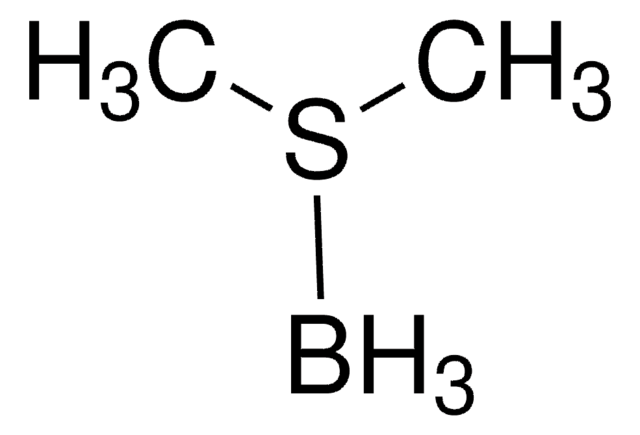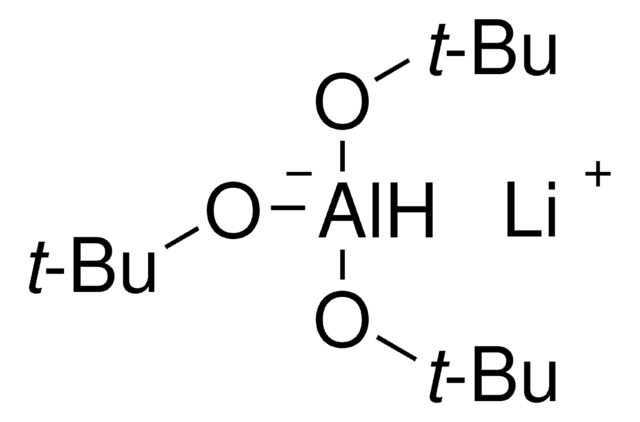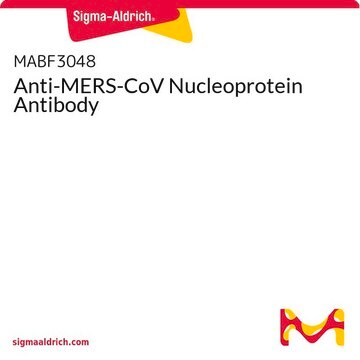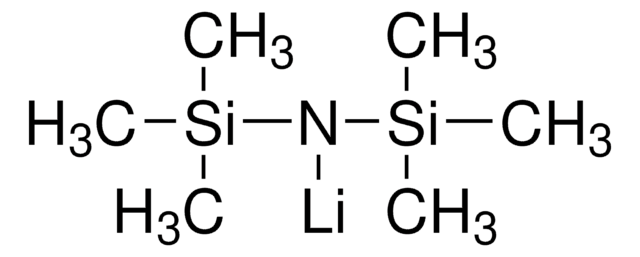658235
Lithium dimethylaminoborohydride solution
1 M in THF
Synonym(s):
N-Methylmethanamine boron complex, Lithium (dimethylamino)trihydroborate, Lithium trihydro(N-methylmethanaminato)borate
About This Item
Recommended Products
reaction suitability
reagent type: reductant
concentration
1 M in THF
refractive index
n20/D 1.423
density
0.882 g/mL at 25 °C
storage temp.
2-8°C
SMILES string
[Li+].[BH3-]N(C)C
InChI
1S/C2H9BN.Li/c1-4(2)3;/h1-3H3;/q-1;+1
InChI key
CEDUMRZWZLVFKS-UHFFFAOYSA-N
Related Categories
General description
Application
Reactant for:
- B-H oxidative addition reactions
- Reduction and amination reactions
- Reduction of N-alkyl lactams
- Synthesis of tertiary amine-boranes
Signal Word
Danger
Hazard Statements
Precautionary Statements
Hazard Classifications
Acute Tox. 4 Oral - Carc. 2 - Eye Irrit. 2 - Flam. Liq. 2 - STOT SE 3
Target Organs
Respiratory system
Supplementary Hazards
Storage Class Code
4.3 - Hazardous materials which set free flammable gases upon contact with water
WGK
WGK 3
Flash Point(F)
1.4 °F - closed cup
Flash Point(C)
-17 °C - closed cup
Regulatory Listings
Regulatory Listings are mainly provided for chemical products. Only limited information can be provided here for non-chemical products. No entry means none of the components are listed. It is the user’s obligation to ensure the safe and legal use of the product.
FSL
Group 3: Spontaneously combustible substances and water- reactive materials
Materials containing Organometallic compounds
Hazardous rank I
1st spontaneously combustible materials and water reactive materials
ISHL Indicated Name
Substances Subject to be Indicated Names
ISHL Notified Names
Substances Subject to be Notified Names
JAN Code
658235-25ML:4548173219646
658235-BULK:
658235-100ML:4548173314549
658235-VAR:
Choose from one of the most recent versions:
Already Own This Product?
Find documentation for the products that you have recently purchased in the Document Library.
Articles
Lithium aminoborohydride (LAB) reagents are a new class of powerful and selective reagents developed in the laboratory of Professor Bakthan Singaram at the University of California, Santa Cruz.
Lithium aminoborohydride (LAB) reagents are a new class of powerful and selective reagents developed in the laboratory of Professor Bakthan Singaram at the University of California, Santa Cruz.
Our team of scientists has experience in all areas of research including Life Science, Material Science, Chemical Synthesis, Chromatography, Analytical and many others.
Contact Technical Service







![[1,1′-Bis(diphenylphosphino)ferrocene]dichloropalladium(II), complex with dichloromethane](/deepweb/assets/sigmaaldrich/product/structures/825/986/4317978b-1256-4c82-ab74-6a6a3ef948b1/640/4317978b-1256-4c82-ab74-6a6a3ef948b1.png)


